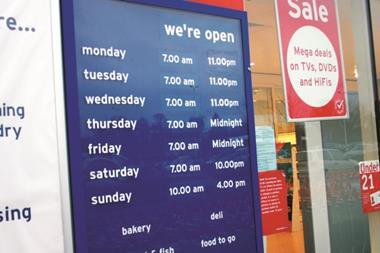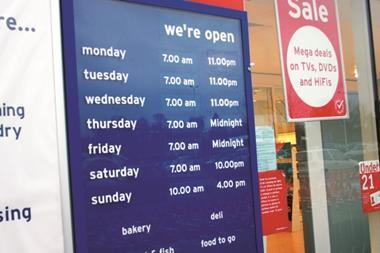The government has denied that the proposal to relax Sunday trading laws during the Olympics is a precursor to removing the restrictions permanently in future.
Launching the Sunday Trading Bill, business minister Mark Prisk said: “I want to make it clear that this is a temporary measure and not a test case for a more permanent relaxation of the rules in the future.”
The Bill had its first reading in the House of Lords yesterday (March 28) as the government attempts to fast-track the legislation through the parliamentary system. The proposed suspension means that shops in England and Wales with a floor space of more than 280 sq metres will not have any restrictions on Sunday opening hours for eight weeks, from July 22 to the end of the Paralympic Games on September 9. After this period, the restrictions will revert back to the current position.
Prisk added: “The London Olympic and Paralympic Games are an opportunity to showcase not just London but the whole of the United Kingdom.
“By suspending Sunday trading laws in England and Wales, on a temporary basis, we will not only contribute to the overall experience of visitors to the Olympics, but it will also provide a boost in sales and employment to the economy.”
However, the trade remains sceptical that the view that the change is only temporary is shared throughout the government. Speaking at the ACS Summit in Birmingham this week, ACS chief executive James Lowman said that if Sunday trading laws are relaxed for the Olympic Games this summer, it is inevitable that there will be an attempt to make this permanent.
“The Chancellor George Osborne wants permanent relaxation of Sunday trading laws, and he’s being very clever about it,” he said. “After all, who would dare oppose the Olympics?
“Government officials have tried to liberalise the rules on at least three occasions and have been rebuffed every time,” added Lowman. “They are now trying to force their will by the back door, because they know people don’t want it and the economic benefits they claim do not stand up to scrutiny.”
Lowman urged all retailers to make as much noise as possible to halt the eight-week relaxation of the laws through the postcard campaign organised by retail trade bodies including ACS, National Federation of Retail Newsagents, Federation of Wholesale Distributors and Rural Shops Alliance.
The Bill is expected to receive its second and third readings shortly after the House of Lords returns from the Easter recess. From there it will then follow the same process in the House of Commons and if successfully passed, it is expected that it will receive Royal Assent at the beginning of May. The government has also undertaken to hold discussions before second reading in the House of Lords on April 24 with the opposition, retailers, employers’ groups and unions with a view to tabling a government amendment to ensure the protection of shop workers.






















1 Readers' comment